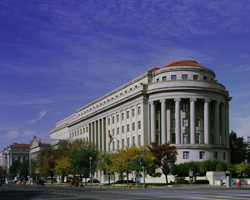 |
| FTC headquarters in Washington, DC |
Generics makers have had just about enough with branded drugmakers tweaking aging meds to hold on to sales, with some arguing in court that the move is inherently anticompetitive. Now the FTC is wading into the debate, saying that pharma companies that make small changes to brand-name products to ward off competition from cheaper copycats may be violating antitrust laws.
The FTC is asking a U.S. Court of Appeals to revisit a lawsuit from Mylan ($MYL) against Allergan ($AGN), which claims that Allergan changed the formula of antibiotic Doryx to stymie its competition. Allergan sold the U.S. rights to the drug earlier this year to Mayne Pharmaceuticals.
Even though a trial judge dismissed Mylan's claims, saying that the company failed to prove any anticompetitive action on the part of Allergan, the FTC doesn't see things quite the same way. The practice of tweaking brand-name drugs, or "product-hopping," can harm consumers who save billions a year through generic meds, the commission said in a statement. Product hopping could also undercut laws that allow pharmacists to automatically swap out brand-name drugs with lower-cost copycats, it added, further jeopardizing fair play.
"A company is unlikely to face potential antitrust liability if it does not take targeted steps to damage the market for the original formulation and instead allows the marketplace itself to choose between that formulation and the modified version," the FTC said in its amicus brief.
An Allergan spokesman did not immediately respond to Bloomberg's requests for comment. And a Mylan spokeswoman declined to comment to the news outlet.
This is not the first time problems have cropped up between branded and generic drugmakers over product hopping. As the FTC points out in its brief, the state of New York sued Actavis, now Allergan, regarding its Alzheimer's powerhouse Namenda. The state claimed that Actavis changed the drug's formula to get around automatic generic substitution, and tried to limit supply of an older version of the med to make sure that most doctors would prescribe the reformulated version first.
Teva Pharmaceutical Industries ($TEVA) also launched a similar case against Abbott Laboratories ($ABT) over its cholesterol-fighter TriCor. Teva and other industry players argued that Abbott patented new versions of TriCor that only had small changes from the original formula. Eventually, Abbott agreed to shell out $184 million to put the suits to rest.
- here's the FTC brief (PDF)
- get the FTC's statement
- read the Bloomberg story
Special Reports: 10 largest U.S. patent losses - Abbott Laboratories | Top 10 generics makers by 2012 revenue